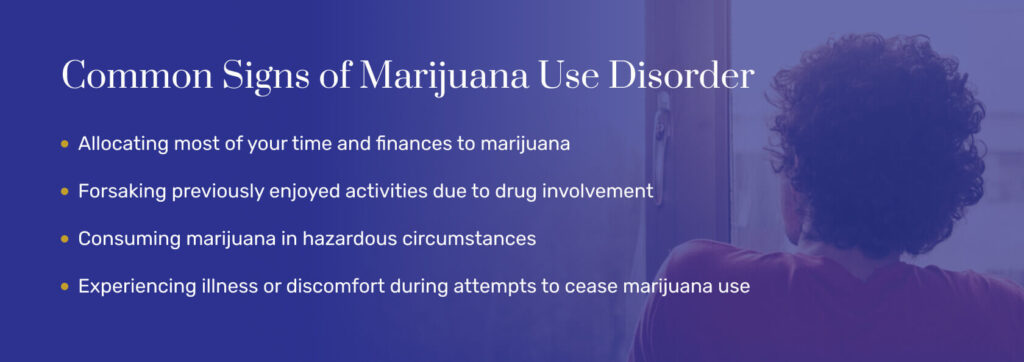You have a drug test on the calendar. How long will you need to prepare? How long does weed stay in your system? Marijuana can linger in your body long after the high wears off.
If thoughts of cheating a test have crossed your mind, it may be time to get support. Our Florida drug addiction treatment center offers evidence-based care to help you regain control.
Marijuana can appear in your system for:
How long does weed stay in saliva?
Saliva for up to 72 hours
How long does weed stay in urine?
Urine for a month or longer (if you’re a heavy user)
How long does weed stay in hair?
Hair for up to 90 days
How long does weed stay in your blood stream?
Blood for up to 36 hours
How long does weed stay in breast milk?
Breast milk for up to 6 weeks
Are you or someone you know struggling with addiction?
I may have a problem I am concerned for a loved oneIf you’re tempted to cheat your drug test results, ask yourself about your marijuana use. Are you really in control, or is it time to consider a treatment program?
How Long Does Weed Stay in Your System?
Each hit of marijuana you take moves through your body in a predictable pattern. That movement dictates how long the drug will appear in your screening tests.
You’ve just inhaled marijuana. The drug follows this path:
- It enters your lungs. The smoke passes through the bronchi and into the alveoli.
- It passes into the bloodstream. Alveoli pass THC into your blood. From there, the substance enters almost every tissue in your body.
- It enters storage. If you keep using marijuana, THC builds up in fat cells. You’re never really free of drugs, even when you feel sober.
Let’s dig a little deeper into the metabolization of marijuana.
Marijuana contains delta-9-tetrahydrocannabinol (THC). After it enters the body, the liver begins to break it down into 11-hydroxy-THC. This chemical causes the feeling of being high, but it doesn’t last. In time, the body breaks that down to THCCOOH, a chemical that’s detected in marijuana tests for drug use.
The sensitivity of your drug test determines how long your marijuana use will be detected. You rarely, if ever, get to choose the method someone uses to screen for drug use.
But you can pass a test by stopping marijuana intake.


Marijuana Addiction
Factors That Influence Marijuana Metabolization Speed
Know that there’s no one-size-fits-all answer to this question: How long does marijuana stay in your system? Many factors can influence how quickly (or slowly) you process each hit you take. These are a few known factors:
Frequency of Marijuana Use
Regular users clear the drug relatively quickly, but frequent users need more time. In a study published in the Iranian Journal of Psychiatry, researchers point out that residual THC levels can remain high following marijuana use, and it can build up within the body. The half-life of a drug in infrequent users is 1.3 days, researchers said, but frequent users experience a drug half-life of five to 13 days. The more you use, the more likely it is that you’ll fail your drug test.
Biological Sex
Sex hormones can influence how quickly marijuana leaves your system. Researchers say that blood clearance rates in women are about 11.8L per hour in women, but men can clear 14.9L per hour. Differences in body composition, including how many fat cells you have, could be responsible.
Method of Marijuana Use
Marijuana is a versatile drug that can be smoked, ingested as a solid, brewed into a tea, and more. We know that the amount of marijuana you use has an impact on how long the drug is detected in a test. The way you take the drug matters too.
Researchers say that the bioavailability (or the percentage of active drug you encounter) is as low as 4% when ingested, but up to 45% is bioavailable when marijuana is inhaled. This difference could mean smokers fail tests longer than edible users do.
Genetics
In 2024, researchers discovered that one in four people have genetic alterations blocking effective THC metabolization. Essentially, the drug lingers in their bodies longer than they should. People like this often have a very positive reaction to marijuana, and they use it more frequently than others. If they do keep using it, they could fail drug tests longer due to their genetic makeup.
Why Does Marijuana Testing Matter?
Marijuana is legal in three-quarters of all states. Should it matter if you use the drug and fail a test?
You could be subject to a drug test if you meet any of the following requirements:
- You seem intoxicated while driving. It’s never smart to use pot and climb behind the wheel. The substance may be legal in your state, but intoxication could put you behind bars. You could also get in an accident and harm yourself or others.
- You get arrested. Some marijuana users experience hallucinations and violent behavior while under the influence. If the authorities get involved, they could test you for the presence of substances.
- You want some types of jobs. Plenty of employers don’t want drug users on the payroll. If you work in law enforcement, health care, education, or other sensitive fields, you might need to pass a test before accepting a job.
Some forms of testing, such as those using blood, can determine just how intoxicated you are. But others, including urine tests, are designed to simply show the presence of THC. If you’ve used the drug at any point and it appears, you will fail your screening exam.
What Happens if You Fail a Drug Test?
The consequences you’ll face if you fail a drug test depend on the reasons for the test.
For example, if you’re tested because you’ve been driving erratically, a failed test could lead to legal problems like a license suspension. If you’ve failed a similar test in the past, you could face jail time.
Employment tests are different. As the Society for Human Resources Management points out, drug tests are typically confidential, as they’re medical records. Your employer should treat your results on a need-to-know basis and typically won’t pass them to law enforcement agencies without a court order. You won’t face police action, in most cases, if you fail a drug test.
In some office environments, failing a drug test also won’t mean losing your job. In some companies, employees are allowed to explain why they may have failed a test and ask for another opportunity to provide a sample.
What happens if you try to pass a drug test by faking your results? In some states (including Florida), that’s a crime. You could face consequences like fines or imprisonment.
Can You Prep for a Marijuana Drug Test?
You’re a regular marijuana user, and you want to hide that during a screening exam. Don’t be fooled by flashy websites and marketing promises. There is no foolproof way to cheat a drug test and ensure that your results are clear.
Don’t walk into your test with a list of debunked excuses, such as:
I have excess body fat.
I am on a diet, and my body is burning off body fat.
I just got done exercising, and I am burning off body fat.
I just had a massage, and it released THC.
Marijuana’s metabolization is largely driven by quantity. The more you use, the more likely it is that you’ll fail a test. Administrators have heard every excuse in the past, and your claims about fat and drugs won’t fool them.
You also can’t prepare to pass a marijuana test by doing these things:
- Drinking a lot of water: Fluid intake will dilute your urine, but THC is still detectable.
- Working out: Sweat can concentrate your urine, but administrators will still find THC.
- Changing your diet: Adding fluid-filled foods to your meal plan a month or so before your test can dilute urine. But THC is still detectable.
The only way to ensure that you can pass a test is to stop using marijuana months before you deliver a sample.

Struggling with marijuana use? Boca Recovery Center provides compassionate care and personalized treatment to help you regain control of your life. With evidence-based therapies and expert support, we’re here to guide your journey toward lasting recovery and a healthier future.
Signs of Marijuana Use Disorder
Attempting to quit but failing is a hallmark of marijuana abuse. If you’ve tried to prepare for a drug test and found yourself relapsing to drugs very quickly, you likely need help.
These are other signs of marijuana abuse:
- Spending the majority of your time and money on drugs
- Giving up activities you used to love because of drugs
- Using marijuana in unsafe situations
- Feeling sick or unwell when you try to quit marijuana use
Behavioral therapies, such as cognitive behavioral therapy and contingency management, are effective ways to address marijuana abuse. A trained therapist can help you build up sobriety skills.
When it’s time for your next drug test, you can take it with confidence, knowing that you’ll pass since you haven’t used.
If you’re noticing signs of heavy use or marijuana dependence, our Indiana drug and alcohol rehab provides personalized treatment to help you stop safely and rebuild your health.
- Marijuana. Valencia Community College.
- Chemistry, Metabolism, and Toxicology of Cannabis: Clinical Implications. (2012). Iranian Journal of Psychiatry.
- Where Marijuana is Legal in the U.S. (April 2022). CNET.
- Marijuana Drug Information. Redwood Toxicology Laboratory.
- Mythbusters: Drug Testing Myths. Ohio Supreme Court.
- Drug Testing Myths Busted. Workplace Safety Screenings.
- Addiction (Marijuana or Cannabis Use Disorder). (October 2020). Centers for Disease Control and Prevention.
- Available Treatments for Marijuana Use Disorders. (July 2020). National Institute on Drug Abuse.
- Mechanisms of Action and Pharmacokinetics of Cannabis. (November 2020). The Permanente Journal.
- A Genetic Difference in THC Metabolism May Explain Why Some Young Adults Have Negative Experiences with Cannabis. (March 2024). Medical University of South Carolina.
- What Are the Rules Surrounding Confidentiality and Sharing of Drug Test Results? Society for Human Resources Management.
- Workplace Drug Testing: What to Do When Employees Fail. (January 2020). Society for Human Resources Management.
- Crimes: Chapter 817—Fraudulent Practices. The Florida Legislature.















